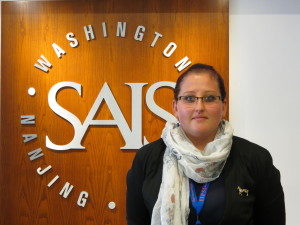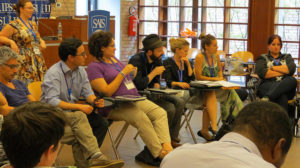by Nastasha Tara Hibbard, South Africa
How can reconciliation be achieved when the memory of a conflict and the need for justice weighs  heavy on one’s soul? This is a question that many people, including myself, have struggled with time and again. This is also a question that Dr Valérie Rosoux, from the University of Louvain, tried to share with us during our time together. Reconciliation is seen as a fuzzy concept which can be quite difficult to define and understand. Everyone has a different perception on what the idea of reconciliation is, what needs to be present for it to happen and how it can be brought about.
heavy on one’s soul? This is a question that many people, including myself, have struggled with time and again. This is also a question that Dr Valérie Rosoux, from the University of Louvain, tried to share with us during our time together. Reconciliation is seen as a fuzzy concept which can be quite difficult to define and understand. Everyone has a different perception on what the idea of reconciliation is, what needs to be present for it to happen and how it can be brought about.
The biggest question that comes to mind when I think about reconciliation is how to remember while also forget in order to move on. This is a difficult thing to achieve when one has experienced deep pain and despair in a time of conflict. To some it is an important part of moving on, and for others it is seen to be a dirty word. It is because of all of this that a practitioner has the great responsibility of considering all the different feelings around the concept in order to ensure that the necessary ‘demobilization of the mind’ is possible.
The first thing Dr. Rosoux did was work with us to establish our own idea of what reconciliation was and what case study we used to create this definition. As a South African and coming from a country that worked for many years to achieve reconciliation after apartheid, I was greatly excited by this. To me, reconciliation is a process of positive development after a conflict, where people work to heal the scars of the past and establish a positive path forward for all. Many other participants had different views and expectations on reconciliation and its many parts.
Throughout the day we discussed various aspects of reconciliation, such as its various meanings, its scope of practice and the limits faced by the field. Valerie posed questions about who needs to be involved, when it can be achieved and how this can be done using different strategies and approaches. Although many might consider that there are no real limits to achieving reconciliation, consideration was placed on the effects of external influence and top-down pressure by parties that push for reconciliation after a conflict.
Reconciliation is a long term process that cannot be achieved overnight. A high level of sensitivity to the situation is needed as emotions and scars are always raw in the case of manifest conflict or post-conflict reconciliation. So, there is no one size fits all approach to create an environment ripe for reconciliation. But through proper analysis and understanding by parties and practitioners, it might be possible to develop a path to peaceful coexistence between conflicting groups.
 Growing up in South Africa, reconciliation is of great importance to me and the work of healing scars is ever present. History and memory will always be present in a place where conflict has taken place and it is up to us, as the new generation of peace builders, to make sure that the pain of the past can be healed. We are the ones who hold the key to the ‘demobilization of the mind’ and move the world into a more peaceful path of coexistence.
Growing up in South Africa, reconciliation is of great importance to me and the work of healing scars is ever present. History and memory will always be present in a place where conflict has taken place and it is up to us, as the new generation of peace builders, to make sure that the pain of the past can be healed. We are the ones who hold the key to the ‘demobilization of the mind’ and move the world into a more peaceful path of coexistence.

